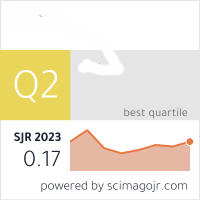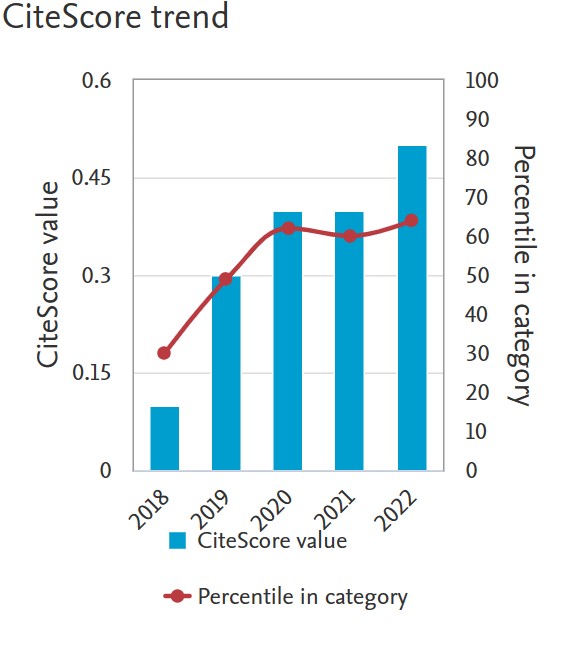A Qualitative Study of Hospitals Decision-Makers Regarding Infection Prevention Control
Keywords:
Infection control; Guidelines; Teaching hospitals;Abstract
Background: Establish defined IPC priorities, evidence-based standards, and a framework for local adaptation so important to infection control program. Guidelines can lead to desired IPC outcomes and quality improvement if they are successfully linked to education and training when implemented and monitored. Aim: To identify areas in which existing practices, infection control guidelines and instruction resources are generally satisfactory and where there are issues that should be addressed with new policies or programs. Methods: A Quantitative study design using purposive non-probability sampling methods was carried out to assess the hospital’s infection control program among decision makers in Erbil teaching hospitals. The study was carried out from 1st June 2021 through 31st December 2021. Data collected by direct interview with eleven managers, assistant managers and heads of infection control units in hospitals. Results: We inferred from 11 interviews in 11 teaching hospitals that there was variation between hospitals in practices regarding infection prevention control practice and guidelines. Most participants mentioned that establishing an infection control committee and infection control guidelines available in the hospitals. Few hospitals had isolation rooms for patients who were suspected due to communicable diseases. Less than half of participants agreed that backup strategies like alternative laboratory services considered. A majority of hospitals had agreed that the incineration of sharps wasn’t available in the hospital. Less than half of study participants showed that there is an availability of computerized resources for the activities developed by the hospital infection control. Nearly more than half of the study participants showed that they had regular reports of the results of the epidemiological surveillance produced. Conclusions: There is a wide difference in teaching hospitals in Erbil city. However, efforts to improve care in this setting should focus on generating new effectiveness research and WHO guideline’s, which is necessary to understand infection prevention and control practices are associated with the lowest infection risk among patients and health staff.
Downloads
References
(PHE), P. H. E. 2020. COVID-19: Guidance for
infection prevention and control in healthcare
settings. Public Health Unit Kingdom,
England.
ABDEL WAHED, W. Y„ HEFZY, E. M.,
AHMED, M. I. & HAMED, N. S. 2020.
Assessment of knowledge, attitudes, and
perception of health care workers regarding
COVID-19, a cross-sectional study from Egypt.
Journal of community health, 45, 1242-1251.
ALI, L. A. M. 2021. Assessment of Infection
Prevention and Control Measures in Hospitals of
Al-Manaqil and Alghorashy Localities-Gezira State Sudan August 2019—March 2020. Abdul
Ghaffar Ali Adam.
AZLAN, A. A., HAMZAH, M. R., SERN, T. J.,
AYUB, S. H. & MOHAMAD, E. 2020. Public
knowledge, attitudes and practices towards
COVID-19: A cross-sectional study in
Malaysia. Pios one, 15, e0233668.
BAYLEYEGN, B„ MEHARI, A., DAMTIE, D.
& NEGASH, M. 2021. Knowledge, attitude
and practice on hospital-acquired infection
prevention and associated factors among
healthcare workers at University of Gondar
Comprehensive Specialized Hospital,
Northwest Ethiopia. Infection and drug
resistance, 14, 259.
BRISIBE, S,, ORDINIOHA, B. & GBENEOLOL,
P. 2014. Knowledge, attitude, and infection
control practices of two tertiary hospitals in
Port Harcourt, Nigeria. Nigerian Journal of
Clinical Practice, 17, 691-695.
CDC 2019. Best practices for environmental
cleaning in healthcare facilities in resource¬
limited settings. Atlanta: CDC; 2019.
CHARANI, E„ CASTRO-SANCHEZ, E.,
SEVDALIS, N., KYRATSIS, Y,
DRUMRIGHT, L., SHAH, N. & HOLMES, A.
Understanding the determinants of
antimicrobial prescribing within hospitals: the role
of “prescribing etiquette”. Clinical Infectious
Diseases, 57, 188-196.
CHEN, Y„ ZHAO, J., SHAN, X., HAN, X.,
TIAN, S„ CHEN, F., SU, X., SUN, Y.,
HUANG, L. & HAN, L. 2017. A point¬
prevalence survey of healthcare-associated
infection in fifty-two Chinese hospitals.
Journal of Hospital Infection, 95, 105-111.
CHOWDHURY, T., CHOWDHURY, H.,
RAHMAN, M. S., HOSSAIN, N„ AHMED,
A. & SAIT, S. M. 2022. Estimation of the
healthcare waste generation during COVID-
pandemic in Bangladesh. Science of the
Total Environment, 811, 152295.
CICCOLINI, M., DONKER, T.,
GRUNDMANN, H,, BONTEN, M. J. &
WOOLHOUSE, M. E. 2014. Efficient
surveillance for healthcare-associated infections
spreading between hospitals. Proceedings of the
National Academy of Sciences, 111, 2271-2276.
DESTA, M., AYENEW, T,, SITOTAW, N.,
TEGEGNE, N,, DIRES, M. & GETIE, M.
Knowledge, practice and associated factors
of infection prevention among healthcare
workers in Debre Markos referral hospital,
Northwest Ethiopia. BMC health services
research, 18, 1-10.
DRAMOWSKI, A., WHITELAW, A. &
COTTON, M. F. 2016. Healthcare-associated
infections in children: knowledge, attitudes and
practice of paediatric healthcare providers at
Tygerberg Hospital, Cape Town. Paediatrics
and international child health, 36, 225-231.
EDWAN, R. A. 2020. Personal protective
equipment (PPE) to prevent the COVID-19.
What do healthcare workers really need to
protect themselves and survive?
GIROTI, A. L. B„ FERREIRA, A. M.,
RIGOTTI, M. A., SOUSA, A. F. L. D,,
FROTA, O. P. & ANDRADE, D. D. 2018.
Hospital infection control programs:
assessment of process and structure indicators.
Revista da Escola de Enfermagem da USP, 52.
GOODARZI, Z., HAGHANI, S,, REZAZADE,
E., ABDOLALIZADE, M. & KHACHIAN,
A. 2020. Investigating the Knowledge,
Attitude and Perception of Hand Hygiene of
Nursing Employees Working in Intensive
Care Units of Iran University of Medical
Sciences, 2018-2019. Maedica, 15, 230.
HUSSEIN, N. R., DANIEL, S., SALIM, K. &
ASSAFI, M. S. 2018. Urinary tract infections
and antibiotic sensitivity patterns among
women referred to Azadi teaching hospital,
Duhok, Iraq. Avicenna J Clin Microbiol Infect,
, 27-30.
HUSSEIN, S„ ESTIFANOS, W., MELESE, E.
& MOGA, F. 2017. Knowledge, attitude and practice of infection prevention measures
among health care workers in wolaitta sodo
Otona teaching and referral hospital. J Nurs
Care, 6,2167-1168.
IBRAHIM, N. K. 2020. Epidemiologic
surveillance for controlling Covid-19
pandemic: types, challenges and implications.
Journal of infection and public health, 13, 1630-
ILIYASU, G„ DAYYAB, F. M., HABIB, Z. G.,
TIAMIYU, A. B., ABUBAKAR, S.,
MIJINYAWA, M. S. & HABIB, A. G. 2016.
Knowledge and practices of infection control
among healthcare workers in a Tertiary
Referral Center in North-Western Nigeria.
Annals of African medicine, 15, 34.
LOBO, D„ SAMS, L. M. & FERNANDEZ, S. L.
Correlation between health
professionals' knowledge, attitude and
practice about infection control measures.
Journal of Medical & Allied Sciences, 9, 26-31.
MMEREKI, D., BALDWIN, A., LI, B. & LIU,
M. 2017. Healthcare waste management in
Botswana: storage, collection, treatment and
disposal system. Journal of material cycles and
waste management, 19, 351-365.
OKWII, M. 2017. Knowledge, Attitude And
Practices Of Nurses On Prevention And Control
Of Hospital Acquired Infections In Soroti
Regional Referral Hospital. International
Health Sciences University.
OYEKALE, A. S. & OYEKALE, T. O. 2017.
Healthcare waste management practices and
safety indicators in Nigeria. BMC public
health, 17, 1-13.
PAUDEL, S„ PADMAWATI, R. S„ GHIMIRE,
A., YONZON, C. L. &
MAHENDRADHATA, Y. 2021. Feasibility
of Find cases Actively, Separate safely and
Treat effectively (FAST) strategy for early
diagnosis of TB in Nepal: An implementation
research. PloSone, 16, e0258883.
PURSSELL, E., GOULD, D. & CHUDLEIGH,
J. 2020. Impact of isolation on hospitalised
patients who are infectious: systematic review
with meta-analysis. BMJ open, 10, e030371.
RIASAT, R,, MALIK, M. A., YOUSAF, I. &
IMAM, K. A. 2019. Knowledge and practices of
infection control among healthcare workers in a
tertiary care hospital. Pakistan Journal of
Physiology, 15, 46-48.
SOLEIMANI, Z., MOSADEGHRAD, A. M,,
ABBASABADIARAB, M., SAFARI, M,,
MORADI, M., HADI, M., ASGARI, M.,
TAHERKHANI, A. & MESDAGHINIA, A.
Paramedical staffs knowledge, attitude,
and performance about nosocomial infection
controls at hospitals: A cross-sectional survey in
Iran. Journal of Environmental Health Science and
Engineering, 19, 1447-1455.
SWAMINATHAN, S., PRASAD, J., DHARIWAL,
A. C,, GULERIA, R„ MISRA, M. C.,
MALHOTRA, R„ MATHUR, P., WALIA, K.,
GUPTA, S. & SHARMA, A. 2017. Strengthening
infection prevention and control and systematic
surveillance of healthcare associated infections in
India, bmj, 358.
THAMER, W. A. H. M. S. & ALRMADHAN, W.
A. 2021. Evaluation o Infection Control in
Medical Laboratories of Hospital and Primary
Health Care Centers in Al-Muthana
Province/Iraq. Annals of the Romanian Society
for Cell Biology, 25, 9930-9936.
VAN MOURIK, M. S., VAN DUIJN, P. J.,
MOONS, K. G,, BONTEN, M. J. & LEE, G.
M. 2015. Accuracy of administrative data for
surveillance of healthcare-associated infections:a
systematic review. BMJ open, 5, e008424.
WEINER-LASTINGER, L. M., ABNER, S,,
EDWARDS, J. R„ KALLEN, A. J.,
KARLSSON, M., MAGILL, S. S,,
POLLOCK, D., SEE, L, SOE, M. M. &
WALTERS, M. S. 2020. Antimicrobial¬
resistant pathogens associated with adult
healthcare-associated infections: summary of
data reported to the National Healthcare Safety Network, 2015—2017. Infection Control
& Hospital Epidemiology, 41, 1-18..
ZAMAN, M. S. U., AHMED, M., MAHBOOB,
N,, IQBAL, H., AFRIN, S. & BISWAS, S. M.
Awareness, Attitude and Practice on
Sterilization among Healthcare Staffs of a
Tertiary Hospital in Bangladesh. Eur. J. Med.
Health Sci, 3, 12-18.
ZHOU, Y„ ZHANG, D., CHEN, Y., ZHOU, S„
PAN, S., HUANG, Y. & BA-THEIN, W.
Healthcare-associated infections and
Shanghai clinicians: A multicenter crosssectional study. PLoS One, 9, e105838.
Downloads
Published
Issue
Section
License
You are free to:
- Share — copy and redistribute the material in any medium or format for any purpose, even commercially.
- Adapt — remix, transform, and build upon the material for any purpose, even commercially.
- The licensor cannot revoke these freedoms as long as you follow the license terms.
Under the following terms:
- Attribution — You must give appropriate credit , provide a link to the license, and indicate if changes were made . You may do so in any reasonable manner, but not in any way that suggests the licensor endorses you or your use.
- No additional restrictions — You may not apply legal terms or technological measures that legally restrict others from doing anything the license permits.
Notices:
You do not have to comply with the license for elements of the material in the public domain or where your use is permitted by an applicable exception or limitation .
No warranties are given. The license may not give you all of the permissions necessary for your intended use. For example, other rights such as publicity, privacy, or moral rights may limit how you use the material.











